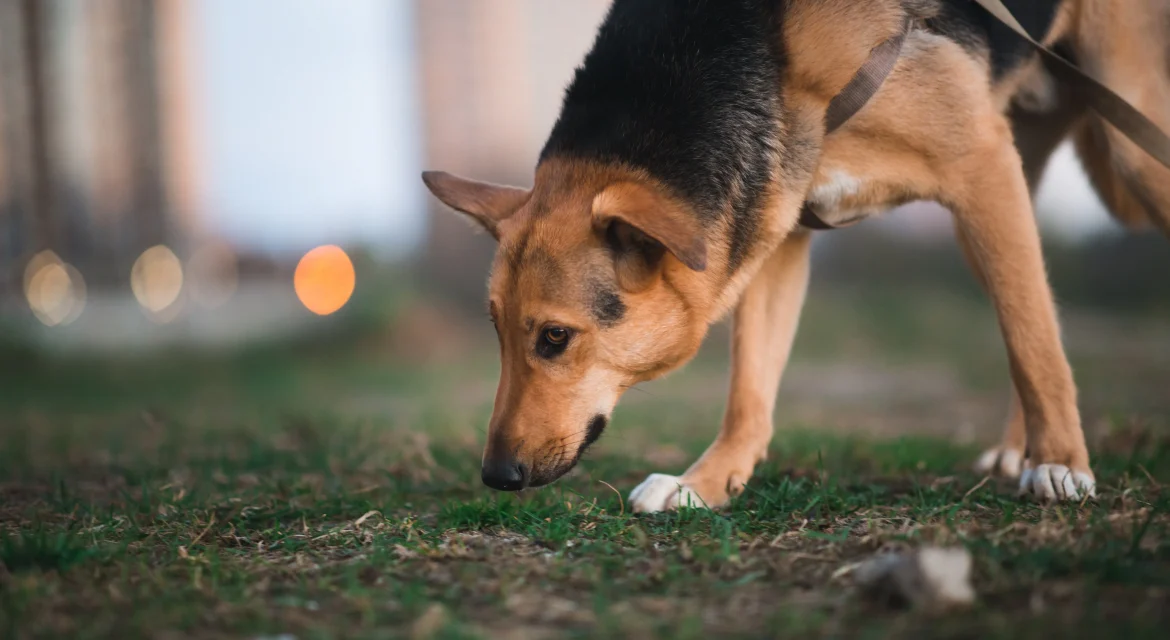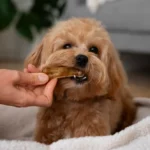If you’ve ever caught your German Shepherd doing something as puzzling, and frankly unpleasant, as eating their own poop, you’re not alone. This behavior, known as coprophagia, is surprisingly common among dogs, particularly in puppies. While it might seem gross to us, it often has deeper behavioral or health-related causes. In this blog, we’ll explore why German Shepherds might eat their poop, what it means, and what you can do to stop eating its own poop.
Understanding Coprophagia in Dogs and How to Manage It
What Is Coprophagia?
Coprophagia is the scientific term for the act of eating poop. While it can occur in many breeds, German Shepherds, because of their intelligence, high energy, and sensitivity to environment, might engage in this behavior for a variety of reasons, from curiosity to underlying medical conditions.
Is Coprophagia Common Among Dogs?
Yes, coprophagia, the act of ingesting feces, is rather prevalent among dogs, particularly puppies. While it may appear nasty to humans, this behaviour can be instinctive, behavioural, or even medical in nature. While it’s not unusual, persistent coprophagia should be addressed, especially in adult dogs, to rule out health issues or behavioral concerns.
Common Reasons Why German Shepherds Eat Their Own Poop
1. Nutritional Deficiency
A German Shepherd’s body may attempt to compensate for dietary deficiencies in vital nutrients such as vitamins, minerals, or enzymes by ingesting faeces, which may still contain nutrients that have not been fully digested. This is especially common for dogs if they are fed low-quality kibble or a diet that doesn’t meet their specific nutritional needs. In their instinctive mind, eating poop can be a way to reabsorb what was lost. This behavior may also indicate malabsorption issues, where their body isn’t properly processing nutrients from their food.
2. Hunger or Inadequate Feeding
If a dog is not being fed enough or is left hungry for long periods, it might start to see its own feces as a food source. This can happen even more in high-energy breeds like German Shepherds, who require a well-balanced and satisfying diet. Hunger drives the instinct to scavenge, and since feces has traces of undigested food, it may seem like a last-resort meal. Dogs that are on low-calorie diets or recovering from illness may also exhibit this behavior more often.
3. Imitation or Learned Behavior
German Shepherds are highly intelligent and observant dogs. If a puppy sees its mother eating feces, something mothers naturally do to keep the den clean, it might mimic the behavior. Similarly, if they see other dogs in the household doing it, they may copy it out of curiosity or habit. Learned behaviors like this can become routine if not addressed early.
4. Attention-Seeking
Dogs crave interaction with their humans, even if it’s negative. If you react strongly (shouting, rushing toward them, or scolding) every time your German Shepherd eats poop, they may interpret this as a way to get your attention. Over time, they may repeat the behavior because they’ve learned that it results in a reaction. It becomes less about the poop itself and more about the response they receive.
5. Stress or Anxiety
Stressful environments or emotionally challenging situations can lead dogs to develop compulsive behaviors, including coprophagia. This might occur during major life changes such as a move, the arrival of a new pet, or being left alone for long periods. They may use eating excrement as a self-soothing mechanism to manage their anxiousness. It’s similar to how some people develop nervous habits under pressure.
6. Boredom or Lack of Mental Stimulation
German Shepherds are working dogs with high intelligence and energy. They may grow bored if they are left alone for an extended period of time or if they are not given enough mental and physical stimulation. A bored dog will often look for ways to entertain itself, even if those behaviors are undesirable. Eating their own poop might just be something they do to pass the time or investigate something different in their environment.
7. Cleaning Instinct
Female dogs, especially mothers, often eat their puppies’ waste to keep the whelping area clean. This maternal instinct can sometimes carry over even after the puppy-raising stage. Some dogs continue this behavior into adulthood, trying to “clean” their surroundings by eating feces. It’s a way of maintaining hygiene, especially if the dog is confined in a space where feces are present.
8. Underlying Medical Conditions
Several health issues can lead to increased hunger or abnormal behaviors. A dog suffering from diabetes, Cushing’s disease, intestinal parasites, or pancreatic insufficiency may be so ravenous that they will eat anything, including excrement. In some cases, the dog’s stool may still contain nutrients due to poor digestion, making it more appealing. If coprophagia appears suddenly or increases in frequency, a vet check-up is important to rule out these causes.
9. Poor House-Training or Punishment History
If a dog has been punished harshly for pooping in the house or in the wrong place, they may start to eat their poop to hide the evidence. This is a learned response to fear, trying to avoid the negative consequence by making it seem like the mistake never happened. Unfortunately, it creates a cycle where the dog continues the behavior out of fear of getting in trouble again. Gentle and consistent house-training, without punishment, is essential to prevent this.
10. Enzyme Deficiency
Some dogs lack the proper enzymes needed to fully digest their food. As a result, their feces may contain undigested nutrients, making it smell or taste like food. The dog may instinctively try to get those lost nutrients back by eating the feces. Adding enzyme supplements or switching to a more easily digestible food can often help correct this issue.
11. Scent Association
Dogs explore the world with their noses, and they are often attracted to strong or interesting smells, even ones humans find disgusting. If a dog poop smells like the food they recently ate, especially with a high-protein or meat-based diet, they may be curious enough to try eating it. This can be especially true if the poop is still fresh and has a strong scent. A dog’s innate foraging instinct includes this sensory interest.
12. Puppy Curiosity
Much like human toddlers, puppies are naturally curious and explore their environment by putting things in their mouths. Feces is just another object to them, and they may try eating it simply to learn more about it. Without proper supervision and training, this behavior can become habitual. Thankfully, most puppies outgrow this stage if they are redirected and positively trained early on.
Is it normal for a German Shepherd to eat poop?
Approximately 16% to 25% of dogs have involved themselves in coprophagia at some stage, according to studies and surveys. While exact breed-specific data is limited, German Shepherds, being active, intelligent dogs, are not exempt from this behavior. German Shepherd puppies are more likely to eat feces, often out of curiosity or learning from their mothers. This behavior usually decreases as they mature, but some adult dogs continue it.
Is It Dangerous?
While it’s not typically life-threatening, eating feces can expose your dog to harmful bacteria, parasites, or viruses, especially if the stool is from another animal. It’s a behavior that should be addressed both for health and hygiene.
Why do dogs eat cat poop?
1. Smells (and Tastes) Like Food: Cat food is high in protein and fat, which makes cat feces more appealing to dogs. To a dog’s sensitive nose, cat poop can smell like a tasty leftover snack. This is especially true if the cat recently ate something rich or meat-heavy.
2. Instinctual Scavenging Behavior: Dogs are natural scavengers. In the wild, they’d eat all kinds of waste and leftovers to survive. Cat poop just seems like another edible item to them, particularly if it’s fresh and nutrient-dense.
3. Nutrient Deficiency or Imbalance: If your dog is lacking certain nutrients, especially digestive enzymes or B vitamins, it may seek out feces to compensate. Cat feces can contain some undigested nutrients, tempting dogs who are instinctively trying to “recycle” nutrition.
4. Boredom or Curiosity: Sometimes dogs just do it out of curiosity, especially puppies or young dogs exploring the world with their mouths. Bored dogs without enough toys, attention, or stimulation might also start raiding the litter box as a way to entertain themselves.
5. Habit or Learned Behavior: Once a dog discovers cat poop and enjoys it, it may become a habit. If they keep finding it available and you don’t intervene, they’ll likely repeat the behavior regularly.
6. Anxiety or Stress Relief: In some cases, dogs eat cat feces as a stress-relieving action or due to compulsive behavior. This can be triggered by changes in environment, loneliness, or general anxiety.
7. Litter Box Temptation: The litter box is like a treasure chest to a dog, smelly, hidden, and full of intriguing textures. If the litter isn’t scooped frequently, or if it’s easy to access, dogs may treat it like a snack box.
Is it dangerous?
It can be. Cat poop may contain parasites like toxoplasma, bacteria like E. coli, or remnants of deworming medications that are harmful to dogs. Eating litter can also cause digestive blockages, especially if it’s clumping litter.
How to Stop Your German Shepherd Dog From Eating Poop?
1. Rule Out Medical Causes First
Before trying to stop your German Shepherd from eating poop, take them to the veterinarian. Sometimes health problems like parasites, digestion issues, or hormone imbalances make dogs eat poop. The vet can check if your dog is sick and help fix any problems. Once your dog is healthy, you can work on training and other fixes.
2. Improve Diet Quality
Feeding your dog balanced diet & quality food helps a lot. If your dog’s food doesn’t have enough nutrients, they might try to eat poop to get missing vitamins or minerals. Choose dog food that has actual meat instead than cheap fillers. Adding things like probiotics or digestive enzymes can also help your dog digest food better and stop eating poop.
3. Clean Up Immediately
Cleaning it up immediately is one of the simplest strategies to prevent poop eating. As soon as your dog leaves the house or enters the yard, pick up their waste. If you have cats, clean their litter box often and put it somewhere your dog can’t reach. When walking, watch your dog and stop them if they try to eat poop.
4. Teach the “Leave It” or “No” Command
Train your dog to listen to basic commands like “Leave it” or “No.” Start practicing with treats in a quiet place, and reward your dog when they listen. Slowly practice in places with more distractions, like outside. This helps your dog learn to ignore poop and other things they shouldn’t eat.
5. Provide More Mental and Physical Stimulation
German Shepherd dogs (GSD) need lots of exercise and mental challenges because they are smart and active. If they get bored or have too much energy, they might eat poop. Take your dog for daily walks, play games, and give them toys that make them think. Keeping your dog busy helps prevent bad habits.
6. Try Taste Deterrents (Food Additives)
There are special products you can add to your dog’s food that make poop taste bad to them. Things like pineapple or pumpkin mixed into their food can change how their poop tastes. Some dogs stop eating poop when their stool tastes unpleasant. Before attempting these, consult your veterinarian to ensure their safety.
7. Use a Muzzle for Outdoor Supervision
There are special products you can add to your dog’s food that make poo taste bad to them. Things like pineapple or pumpkin mixed into their food can change how their poop tastes. Some pup stop eating poop when their stool tastes unpleasant. To ensure their safety, consult your veterinarian before attempting these.
8. Avoid Harsh Punishment
Don’t hit, scold, or otherwise discipline your dog for eating the poop. This can make them scared or stressed and might make the problem worse. Instead, be calm and use gentle training to teach your dog what’s right. Reward good behavior and gently stop them when they try to eat poop.
9. Keep Their Environment Clean and Predictable
Dogs do better when their life is calm and routine. Clean your dog’s crate regularly and keep their space tidy. A clean environment helps lower stress, and your dog is less likely to eat his poop. Make sure your dog has regular times for meals, walks, and play.
10. Address Anxiety and Stress
Sometimes dog will eat poop due to anxious or they are stressed. Changes in the home, being alone, or loud noises can upset them. Use calming sprays, safe spaces, or soothing music to help your dog relax. If your dog is very anxious, talk to a dog behavior expert for advice.
How to Safely Clean Your German Shepherd’s Mouth After Eating Feces?
This isn’t going to be fun or easy at all, but it’s something we absolutely must do. After your German Shepherd has had a “poop dinner,” it’s crucial to clean their mouth carefully to prevent harmful bacteria from causing infections or bad health issues. Here’s how to do it safely and effectively:
- Rinse Their Mouth Gently: Use lukewarm water and a soft cloth or syringe to clean their mouth gently. Don’t force it.
- Use Dog-Safe Oral Products: Only use vet-approved dental rinses or wipes made for dogs, not human mouthwash.
- Brush Their Teeth: If possible, brush with dog toothpaste and a dog toothbrush to remove germs.
- Give Dental Chews or Toys: Offer safe chew toys or dental treats to help clean teeth and freshen breath.
- Watch for Problems: Look out for drooling, bad breath, swelling, or changes in behavior. See a vet if needed.
Why does my German Shepherd still eat poop?
Even if you’ve tried everything, your German Shepherd might still eat poop for several reason from health problems like parasites, digestion ussues, habit, and other environmental factors.
What to do?
Keep up with vet visits, increase mental and physical exercise, maintain strict cleaning habits, and continue training with patience. Sometimes professional help from a dog trainer or behaviorist can make a big difference.




